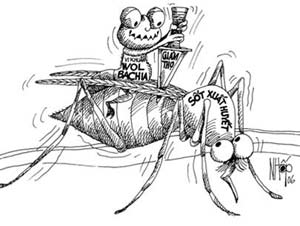Currently, the southern provinces alone have reported over 20,000 cases of dengue fever, which is 1.5 times higher than the same period in 2005. In this context, there is hope for a four-year research project starting this September: reducing the lifespan of disease-causing mosquitoes using… bacteria. Dr. Vu Sinh Nam, Deputy Director of the Department of Preventive Health (Ministry of Health), told Tuổi Trẻ:
 – This research project is funded by the Bill & Melinda Gates Foundation, established by American billionaire Bill Gates, through the University of Queensland (Australia). The main goal is to find a new biological agent, a bacterium called Wolbachia, to reduce dengue fever. This bacterium lives as a parasite in mosquitoes, shortening their lifespan.
– This research project is funded by the Bill & Melinda Gates Foundation, established by American billionaire Bill Gates, through the University of Queensland (Australia). The main goal is to find a new biological agent, a bacterium called Wolbachia, to reduce dengue fever. This bacterium lives as a parasite in mosquitoes, shortening their lifespan.
The average lifespan of a mosquito is about one month. From the 12th day of its life, a mosquito feeds every 3-4 days. This is when mosquitoes can transmit diseases (such as dengue fever). However, if the aforementioned bacterium is present, the mosquito will only live for 12 days, preventing it from transmitting diseases to humans.
* What is the main research direction of the project, sir?
– The project will mainly focus on genetics, heredity, and the effects of Wolbachia. For example, we will investigate whether this Wolbachia exists in Vietnam, whether it can parasitize mosquitoes, and its potential for application in Vietnam… Of course, this is just research with initial ideas.
One thing we also need to understand is that in the past, in the northern regions, especially in cities, only the Ae. aegypti mosquito was responsible for dengue fever (which is why this mosquito is referred to as the… city mosquito). During the dengue epidemic in 1987, only this type of mosquito was observed.
However, currently, this mosquito is not found in many areas, replaced by the Ae. albopictus mosquito, which has a lower disease transmission capability. Therefore, the research will also look into the reasons for this issue, particularly whether Wolbachia is parasitizing mosquitoes and causing this phenomenon. If the research is successful, we will implement it in Vietnam starting in 2010.
* If Wolbachia is found to be parasitizing some disease-causing mosquitoes, how can it be propagated to reduce the lifespan of mosquitoes, sir?
– Wolbachia exists naturally and also naturally parasitizes mosquitoes. If we find it, we will confine the area to release it naturally, allowing it to naturally parasitize mosquitoes. If both male and female mosquitoes carry Wolbachia, they will produce offspring with a very short lifespan.
* Before starting this project in Vietnam, research has been conducted in Australia and several other countries. What were the results, sir?
– In Australia, scientists have only monitored the parasitism of Wolbachia in fruit flies in the laboratory. The results show that the lifespan of fruit flies is also very short… In this research, not only Vietnam is involved, but scientists from Australia, Thailand, and Japan are also conducting similar studies in their countries.
* A final question, sir. Are we powerless against the dengue epidemic in the south? What reasons contribute to the high number of dengue cases in the southern provinces, resulting in many deaths each year?
– I know many people want to ask this question: Why is dengue persistent in the south? In the 1998 epidemic season, half of the dengue cases were in the north, central, and highland regions, but now over 90% of cases are concentrated in the south. Dengue cases in the north have significantly decreased to only a few dozen per year.
The challenge is that the climate in the south is suitable for mosquito breeding year-round, and the mosquito population in Vietnam is still very large due to small-scale prevention projects. Moreover, individuals who have contracted dengue only gain immunity to that specific virus type and can still contract dengue from other virus types.
Recently, in the southern provinces, many individuals have contracted dengue for the second time with severe symptoms. We refer to this as the “enhancement effect.” Another issue is that dengue prevention must occur at the household level, and this work can only be effective if families voluntarily participate.
LAN ANH


















































